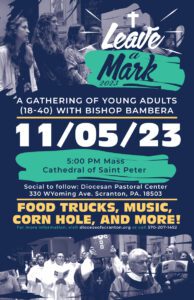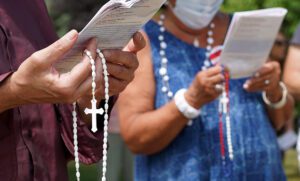



(OSV News) – Amid a manhunt for a suspected mass shooter, a pastor in Maine is calling for “three-pronged prayer.”
Father Daniel Greenleaf, pastor of Prince of Peace Parish in Lewiston, told OSV News that he is interceding for at least 18 people killed and 13 injured in an Oct. 25 attack in his town, as well as for their families and law enforcement.
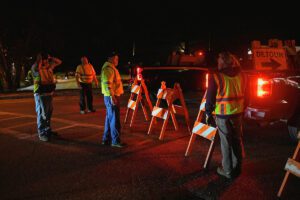
The shootings, which began around 7 p.m. ET in Maine’s second-largest city, took place in two locations: Schemengees Bar and Grille restaurant, and the Just-in-Time Recreation bowling alley, just over 4 miles apart from each other in Lewiston.
Police quickly issued shelter-in-place orders that remained standing for the communities of Lewiston, Lisbon and Bowdoin as of the morning of Oct. 26.
Hundreds of local, regional and federal officials are searching for 40-year-old Robert Card of Bowdoin, a certified firearms instructor and a petroleum supply specialist in the U.S. Army Reserve, who has been named as a person of interest. According to law enforcement, Card — who had reported having mental health issues — had recently threatened to attack a National Guard facility in Saco, Maine. He is considered armed and dangerous.
At an Oct. 26 press conference, Maine Gov. Janet Mills said the attack “strikes at the very heart of who we are.”
President Joe Biden, who has spoken with Mills, ordered flags to be flown at half-staff until sunset Oct. 30.
Due to the active lockdowns, the five churches that comprise Prince of Peace Parish – the Basilica of Sts. Peter and Paul, Holy Cross, Holy Family, Holy Trinity and Our Lady of the Rosary – have been temporarily closed, with Mass livestreamed, said Father Greenleaf.
Two of the churches, Holy Cross and Holy Trinity, were particularly close to the shooting and search. Holy Cross is “right up the street” from Schemengees, and Holy Trinity is adjacent to the place a vehicle, believed to be abandoned by Card after the attacks, was found, said Father Greenleaf.
None of the church buildings have been breached due to the shootings or the search, he said — although the search has come close.
As Father Greenleaf celebrated a livestreamed Oct. 26 Mass in Time of War or Civil Disturbance, “helicopters and the police came through the streets, and we could hear that during the homily,” he said. “It’s still a scary situation. (Card is) armed and dangerous.”
Father Greenleaf said Bishop Robert P. Deeley of Portland contacted him during the overnight hours and again during the morning of Oct. 26.
The bishop issued an Oct. 26 statement saying he had learned of the shootings with “profound sadness.”
Bishop Deeley said “it is heartbreaking to hear of lives lost and dozens injured and to know of the pain and grief that so many families are experiencing.
“We pray for all those impacted by this terrible violence, that the Lord may provide them with consolation in the midst of their sorrow,” he said. “In this moment of trial and uncertainty, let us raise up our prayers, asking God to give strength to them and to our community now and in the coming days, and we ask him to protect our law enforcement officers as they seek to prevent further harm. Pray also for our hospital personnel and chaplains who are caring for the injured.”
Father Greenleaf said it is not yet clear if any of the victims are parishioners or their loved ones, noting he had confirmed Card is not a member of the parish. The mayor of nearby Auburn, Jason J. Levesque, told CNN several of his residents were impacted, adding there would be “very few people in this community that have not been touched by this.”
Prayer and fellowship are critical in this time of tragedy, said Father Greenleaf, who led an online rosary and morning prayer following his Oct. 26 Mass, and who has sent parishwide email messages to reassure his flock.
“As soon as we can open up, we will open up the church and make it a place of prayer, and expose the Blessed Sacrament, and all day long, if we need to, as long as we possibly can,” said Father Greenleaf, adding he also is looking to provide counselors if possible.
In the meantime, “I do pray for the law enforcement, that they’re doing their job, that God will give them the strength and courage they need to end the crisis,” especially amid an overnight search that has left them sleep deprived, he said.
“And then (we) certainly (pray) for the families that have been affected, and then the souls who have died,” said Father Greenleaf. “So let’s send some graces toward the law enforcement. And then let’s take care of the families.”
“While it may seem impossible to find hope in a time such as this, we can draw hope from our spiritual roots, trusting that a loving God will not abandon us,” said Bishop Deeley in his statement. “As we pray to him in our various ways, may he strengthen us and show us the way forward during the difficult days that lie ahead.”
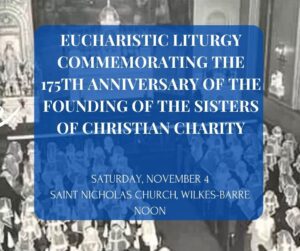
WILKES-BARRE — The Diocese of Scranton will fittingly share in the yearlong commemoration of the 175th anniversary of the founding of the Sisters of Christian Charity (SCC) when the Most Rev. Joseph C. Bambera, Bishop of Scranton, will celebrate a jubilee Eucharistic liturgy next month in Wilkes-Barre, where the religious Sisters began their venerable ministry in America.
Bishop Bambera will serve as principal celebrant of a Pontifical Mass of Thanksgiving on Saturday, Nov. 4, at noon at Saint Nicholas Church, Wilkes-Barre.
In addition to marking 175 years since the SCC congregation was established in Germany, the liturgy will also celebrate the 150th anniversary of the arrival of Christian Charity Sisters in the Scranton Diocese and, thus, the United States.
Blessed Pauline von Mallinckrodt, foundress of the Sisters of Christian Charity, was born on June 3, 1817, in Minden, Germany, and at a young age was drawn to care for impoverished families in Paderborn — nursing their sick and providing them food. In 1840, her charitable work extended to Catholic education with the opening of a kindergarten and school for blind children.
As Pauline’s burning love for God and care for the needy led her to consider a religious vocation, she was advised to begin her own community of women religious. On Aug. 21, 1849, Pauline, together with three other women founded the Sisters of Christian Charity, whose ministry soon spread rapidly throughout Germany and, eventually, North and South America.
At the request of Monsignor Peter Nagel, and with the blessing of Bishop William O’Hara, first Bishop of Scranton, Christian Charity Sisters arrived as Saint Nicholas Parish in Wilkes-Barre on Oct. 15, 1873, at the direction of Mother Pauline. The foundress graciously welcomed the request for SCC nuns to serve as teachers in Diocesan schools as Catholic education was suffering from military repression in her native Germany.
Upon welcoming Mother Pauline on her visit to the United States, Bishop O’Hara granted her permission to establish a permanent presence in Wilkes-Barre. By 1877, the new SCC Motherhouse – Mallinckrodt Convent — was ready for occupancy.
The residence also included Saint Ann’s Academy, a private school for girls.
Eventually, the Motherhouse headquarters was transferred to Wilmette, Ill., in 1916, and then to Mendham, N.J., in 1927.
German Catholic pastors throughout the Scranton Diocese soon requested the Christian Charity Sisters to teach in their parish schools, and the congregation grew quickly beyond diocesan borders and throughout the U.S.
Along with their ministry in Catholic education, the SCC religious community responded to the need for Catholic healthcare, which led the Sisters to purchase land in Williamsport and build Divine Providence Hospital, known today as UPMC.
Throughout the years, the charism and ministries of the Sisters of Christian Charity has adapted to the changing needs of the Catholic Church, particularly in the areas of education, healthcare and social work of various kinds. Pauline von Mallinckrodt died April 30, 1881, was beatified by Pope Saint John Paul II on April 14, 1985.
Since their arrival in the United States 150 years ago, the Sisters of Christian Charity have served in nearly 20 states and at the following Catholic parishes and schools in the Diocese of Scranton:
Saint Nicholas, Saint Ann’s Academy, Saint Boniface and Bishop Hoban/Holy Redeemer High School, Wilkes-Barre; Saint Mary Assumption and Seton Catholic High School, Pittston; Sacred Heart, Luzerne; Saint Mary Assumption and Saint John the Baptist, Scranton; Saint Boniface, Saint Mary High School, Saint Ann, Bishop Neumann High School, Saint Anthony Center and Divine Providence Hospital, Williamsport; Immaculate Conception, Bastress; Saint Mary Magdalen, Honesdale; Saint Basil, Dushore; Sacred Heart, Duryea; Central Catholic/Bishop O’Reilly High School, Kingston; and Holy Trinity and Bishop Hafey High School, Hazleton.
Currently, the Sisters serve in ministry at Saint Nicholas Parish, Wilkes-Barre; Saint Jude Parish, Mountain Top; Nativity Miguel School, Scranton; and UPMC in Williamsport and Muncy.
VATICAN CITY (CNS) – The Catholic Church must continue discerning its future by listening to everyone, starting with the poorest and excluded, after the assembly of the Synod of Bishops closes its first session, participants said in a letter addressed to the “People of God.”
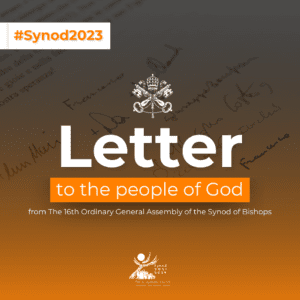
The two-and-a-half-page letter published Oct. 25 recounted the spirit and activities of the assembly’s first session, held at the Vatican Oct. 4-29, and looked ahead to the assembly’s second session, expressing hope that the months leading up to October 2024 “will allow everyone to concretely participate in the dynamism of missionary communion indicated by the word ‘synod.'”
“This is not about ideology, but about an experience rooted in the apostolic tradition,” the synod assembly wrote.
While the letter does not raise specific topics or questions to be addressed in the assembly’s next session — a synthesis report reflecting the work of the first session and next steps is expected to be published Oct. 28 – it did say that to “progress in its discernment, the church absolutely needs to listen to everyone, starting with the poorest.”
“It means listening to those who have been denied the right to speak in society or who feel excluded, even by the Church,” the letter said, specifying the need to listen to victims of racism, particularly Indigenous populations. “Above all, the Church of our time has the duty to listen, in a spirit of conversion, to those who have been victims of abuse committed by members of the ecclesial body and to commit herself concretely and structurally to ensuring that this does not happen again.”
The letter made special reference to the need for listening to the laity, catechists, children, the elderly, families and those who want to be involved in lay ministries and “participate in discernment and decision-making structures” of the church.
The full text of the letter is below:
Dear sisters, dear brothers,
As the proceedings of the first session of the 16th Ordinary General Assembly of the Synod of Bishops draw to a close, we want to thank God with all of you for the beautiful and enriching experience we have lived. We lived this blessed time in profound communion with all of you. We were supported by your prayers, bearing with you your expectations, your questions, as well as your fears. As Pope Francis requested two years ago, a long process of listening and discernment was initiated, open to all the People of God, no one being excluded, to “journey together” under the guidance of the Holy Spirit, missionary disciples engaged in the following of Jesus Christ.
The session in which we have been gathered in Rome since 30 September is an important phase of this process. In many ways it has been an unprecedented experience. For the first time, at Pope Francis’ invitation, men and women have been invited, in virtue of their baptism, to sit at the same table to take part, not only in the discussions, but also in the voting process of this Assembly of the Synod of Bishops. Together, in the complementarity of our vocations, our charisms and our ministries, we have listened intensely to the Word of God and the experience of others. Using the conversation in the Spirit method, we have humbly shared the wealth and poverty of our communities from every continent, seeking to discern what the Holy Spirit wants to say to the Church today. We have thus also experienced the importance of fostering mutual exchanges between the Latin tradition and the traditions of Eastern Christianity. The participation of fraternal delegates from other Churches and Ecclesial Communities deeply enriched our discussions.
Our assembly took place in the context of a world in crisis, whose wounds and scandalous inequalities resonated painfully in our hearts, infusing our work with a particular gravity, especially since some of us come from countries where war rages. We prayed for the victims of deadly violence, without forgetting all those who have been forced by misery and corruption to take the dangerous road of migration. We assured our solidarity and commitment alongside the women and men all over the world who are working to build justice and peace.
At the invitation of the Holy Father, we made significant room for silence to foster mutual listening and a desire for communion in the Spirit among us. During the opening ecumenical vigil, we experienced how the thirst for unity increases in the silent contemplation of the crucified Christ. In fact, the cross is the only cathedra of the One who, having given himself for the salvation of the world, entrusted His disciples to His Father, so that “they may all be one” (John 17:21). Firmly united in the hope brought by His Resurrection, we entrusted to Him our common home where the cries of the earth and the poor are becoming increasingly urgent: “Laudate Deum!” (“Praise God!”), as Pope Francis reminded us at the beginning of our work.
Day by day, we felt the pressing call to pastoral and missionary conversion. For the Church’s vocation is to proclaim the Gospel not by focusing on itself, but by placing itself at the service of the infinite love with which God loved the world (cf. John 3:16). When homeless people near St. Peter’s Square were asked about their expectations regarding the Church on the occasion of this synod, they replied: “Love!”. This love must always remain the ardent heart of the Church, a Trinitarian and Eucharistic love, as the Pope recalled on October 15, midway through our assembly, invoking the message of Saint Thérèse of the Child Jesus. It is “trust” that gives us the audacity and inner freedom that we experienced, not hesitating to freely and humbly express our convergences, differences, desires and questions.
And now? We hope that the months leading to the second session in October 2024 will allow everyone to concretely participate in the dynamism of missionary communion indicated by the word “synod”. This is not about ideology, but about an experience rooted in the apostolic tradition. As the Pope reminded us at the beginning of this process, “communion and mission can risk remaining somewhat abstract, unless we cultivate an ecclesial praxis that expresses the concreteness of synodality (…) encouraging real involvement on the part of each and all” (October 9, 2021). There are multiple challenges and numerous questions: the synthesis report of the first session will specify the points of agreement we have reached, highlight the open questions, and indicate how our work will proceed.
To progress in its discernment, the Church absolutely needs to listen to everyone, starting with the poorest. This requires a path of conversion on its part, which is also a path of praise: “I thank you, Father, Lord of heaven and earth, that you have hidden these things from the wise and understanding and revealed them to little children” (Luke 10:21)! It means listening to those who have been denied the right to speak in society or who feel excluded, even by the Church; listening to people who are victims of racism in all its forms – in particular in some regions to indigenous peoples whose cultures have been scorned. Above all, the Church of our time has the duty to listen, in a spirit of conversion, to those who have been victims of abuse committed by members of the ecclesial body, and to commit herself concretely and structurally to ensuring that this does not happen again.
The Church also needs to listen to the laity, women and men, all called to holiness by virtue of their baptismal vocation: to the testimony of catechists, who in many situations are the first proclaimers of the Gospel; to the simplicity and vivacity of children, the enthusiasm of youth, to their questions, and their pleas; to the dreams, the wisdom and the memory of elderly people. The Church needs to listen to families, to their educational concerns, to the Christian witness they offer in today’s world. She needs to welcome the voice of those who want to be involved in lay ministries and to participate in discernment and decision-making structures.
To progress further in synodal discernment, the Church particularly needs to gather even more the words and experience of the ordained ministers: priests, the primary collaborators of the bishops, whose sacramental ministry is indispensable for the life of the whole body; deacons, who, through their ministry, signify the care of the entire Church for the most vulnerable. She also needs to let herself be questioned by the prophetic voice of consecrated life, the watchful sentinel of the Spirit’s call. She also needs to be attentive to all those who do not share her faith but are seeking the truth, and in whom the Spirit, who “offers everyone the possibility of being associated with this paschal mystery” (Gaudium et Spes 22, 5), is also present and operative.
“The world in which we live, and which we are called to love and serve, even with its contradictions, demands that the Church strengthen cooperation in all areas of her mission. It is precisely this path of synodality which God expects of the Church of the third millennium” (Pope Francis, October 17, 2015). We do not need to be afraid to respond to this call. Mary, Mother of the Church, the first on the journey, accompanies our pilgrimage. In joy and in sorrow, she shows us her Son and invites us to trust. And He, Jesus, is our only hope!
Vatican City, October 25, 2023
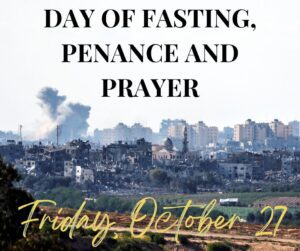
VATICAN CITY (CNS) – The Catholic Church must continue discerning its future by listening to everyone, starting with the poorest and excluded, after the assembly of the Synod of Bishops closes its first session, participants said in a letter addressed to the “People of God.”
The two-and-a-half-page letter published Oct. 25 recounted the spirit and activities of the assembly’s first session, held at the Vatican Oct. 4-29, and looked ahead to the assembly’s second session, expressing hope that the months leading up to October 2024 “will allow everyone to concretely participate in the dynamism of missionary communion indicated by the word ‘synod.'”
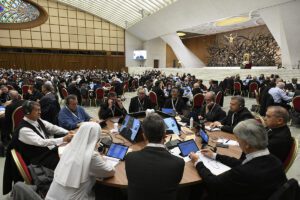
“This is not about ideology, but about an experience rooted in the apostolic tradition,” the synod assembly wrote.
While the letter does not raise specific topics or questions to be addressed in the assembly’s next session — a synthesis report reflecting the work of the first session and next steps is expected to be published Oct. 28 — it did say that to “progress in its discernment, the church absolutely needs to listen to everyone, starting with the poorest.”
“It means listening to those who have been denied the right to speak in society or who feel excluded, even by the Church,” the letter said, specifying the need to listen to victims of racism, particularly Indigenous populations. “Above all, the Church of our time has the duty to listen, in a spirit of conversion, to those who have been victims of abuse committed by members of the ecclesial body and to commit herself concretely and structurally to ensuring that this does not happen again.”
The letter made special reference to the need for listening to the laity, catechists, children, the elderly, families and those who want to be involved in lay ministries and “participate in discernment and decision-making structures” of the church.
It also specified that the church must gather more experiences and testimonies from priests, bishops and consecrated persons, while being “attentive to all those who do not share her faith but are seeking the truth.”
The drafting of the letter was approved by the synod assembly and was discussed both during small group working sessions and among the entire assembly Oct. 23, the synod general secretariat said.
It began by recounting the “unprecedented experience” of men and women participating in discussions and exercising voting rights in a synod assembly by virtue of their baptism and not based on ordination.
The assembly, it said, took place in a “world in crisis, whose wounds and scandalous inequalities resonated painfully in our hearts, infusing our work with a particular gravity, especially since some of us come from countries where war rages.”
The letter also highlighted the “significant room for silence” made at the Pope Francis’ invitation, meant to “foster mutual listening and a desire for communion in the Spirit among us.”
“Trust,” the synod assembly wrote, is what “gives us the audacity and inner freedom that we experienced, not hesitating to freely and humbly express our convergences, differences, desires and questions.”
“Day by day, we felt the pressing call to pastoral and missionary conversion,” the assembly said. “For the Church’s vocation is to proclaim the Gospel not by focusing on itself, but by placing itself at the service of the infinite love with which God loved the world.”
The letter also shared that homeless people near St. Peter’s Square were asked about their expectations of the church on the occasion of the synod and they replied: “Love!”
VATICAN CITY (CNS) – Pope Francis again called for the release of hostages taken from Israel by Hamas militants and for allowing humanitarian aid into Gaza.
“I am always thinking about the serious situation in Palestine and Israel,” the pope said during his weekly general audience in St. Peter’s Square Oct. 25.
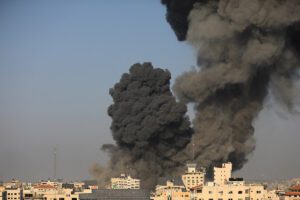
“I encourage the release of hostages and the entry of humanitarian aid into Gaza,” he said, and “I continue to pray for those who suffer, to hope for avenues toward peace in the Middle East and martyred Ukraine and in other regions wounded by war.”
More than 200 people were believed to be held by Hamas and other Palestinian militant groups in Gaza after their attacks on Israel Oct. 7. While some aid was coming in from Egypt, Israel has imposed a full blockade on Gaza.
The pope spoke the morning after Archbishop Gabriele Caccia, the Vatican’s permanent observer at the United Nations, told the Security Council that although dialogue seems impossible right now, it is the “only viable option for a lasting end to the cycle of violence” that has plagued the Holy Land.
“Amidst the escalating violence, it is imperative for the authorities of the state of Israel and the state of Palestine to demonstrate audacity to renew their commitment toward a peace based on justice and respect for the legitimate aspirations of both sides,” said the archbishop.
“The Holy See remains convinced that the two-state solution still offers hope for such a peace,” he said during a Security Council open debate Oct. 24 on “the situation in the Middle East, including the Palestinian question.”
“In the most absolute terms and unequivocally,” the archbishop said, the Holy See condemns “the terrorist attack carried out by Hamas and other armed groups” against Israel.
“Thousands were barbarically killed and wounded. Others were taken hostage,” he said. “These crimes demonstrate utter contempt for human life and are unjustifiable,” he said, repeating the pope’s call for the release of hostages.
The “distressing escalation of violence,” the archbishop said, has caused “deplorable levels of suffering” in a land that is “so dear to Christians, Jews and Muslims.”
At the same time, Archbishop Caccia said that “the criminal responsibility for terrorist acts is always personal and can never be attributed to an entire nation or people,” for example, by blaming all Palestinians or even all the people of Gaza for the actions of Hamas and allied groups.
Israel’s right self-defense, like the right of every nation attacked, “must always comply with international humanitarian law, including the principle of proportionality,” he said.
The Vatican is seriously concerned about the “unfolding humanitarian disaster in Gaza, which has claimed thousands of lives and has displaced hundreds of thousands of people,” he said. Israel’s “total siege” of the territory is causing “indiscriminate suffering among the population, including due to shortages of food, fuel and medical supplies.”
Archbishop Caccia repeated Pope Francis’ call for “the urgent facilitation and the continuation of humanitarian corridors so that aid can reach the entire population.”
(OSV News) – Catholic social teaching has widely been described as “the church’s best kept secret.” A recent report indicates that may still be the case, and that efforts to spread it may be thwarted by a reduction in diocesan positions dedicated to social action.
A report from the Loyola Institute for Ministry at Loyola University New Orleans titled “Advancing the Social Mission of the Catholic Church” indicates that while most of the people polled are familiar with Catholic social teaching, they have encountered little information about it from their parishes, dioceses or among fellow U.S. Catholics.
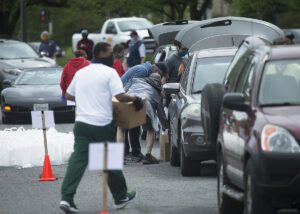
The U.S. Conference of Catholic Bishops describes Catholic social teaching as the church’s “wisdom about building a just society and living lives of holiness amidst the challenges of modern society,” and organizes it into seven main themes: life and dignity of the human person; call to family, community and participation; rights and responsibilities; option for the poor and vulnerable; the dignity of work and the rights of workers; solidarity; and care for God’s creation.
In the spring of 2020, the Washington-based Catholic Roundtable Association of Diocesan Social Action Directors received a grant from the USCCB’s Catholic Campaign for Human Development. The Roundtable collaborates with the USCCB Department of Justice, Peace and Human Development, and partners with Catholic Charities USA and Catholic Relief Services.
The USCCB funding enabled the Roundtable to research two primary areas of concern: “the perceived diminishment of diocesan staff positions around the U.S. whose primary responsibility was the promotion of Catholic social teaching and social action” and “the level of understanding and awareness of Catholic social teaching among the clergy, religious and laity in the U.S. Catholic Church.”
The Roundtable commissioned the Loyola Institute for Ministry to conduct research via two surveys. The first, in 2021, surveyed Roundtable members, attendees at its Social Action Summer Institute, diocesan parish social ministry employees, and others identified by the Roundtable and CCHD, and also included 19 additional interviews.
Results from 311 survey respondents indicated around 90% of those polled said they are familiar with Catholic social teaching. But when asked whether they perceived other Catholics to be familiar with this teaching, respondents placed that knowledge at slightly over 20% for Catholics in their parish, a bit less than 20% for Catholics in their diocese and less than 10% for Catholics nationally.
Slightly less than half of respondents to the first survey said their diocese is committed to promoting action on behalf of Catholic social teaching’s themes. About 45% reported observing a reduction in local social action offices.
“It’s really a confirmation of what’s been pretty palpable for most of us in this kind of ministry across the country — and that is, we know anecdotally that many of our peers are losing their roles,” said Kevin Fitzpatrick, Roundtable board chairman.
“Either the offices are being shut down by the diocese, or there’s attrition: They (social action directors) will resign and retire, and then that role will not be refilled,” Fitzpatrick said. “Or, an office will be merged with something else.”
While that means fewer members in the Roundtable’s association, he said, “the larger picture for the Catholic Church is how do we offer this kind of support for Catholic social teaching in our parishes, our dioceses, and our schools if people who are steeped in it and have a background in education are not available widely throughout the country?”
The bishops appear to be aware of reduction in social action ministry, he said, “but, for whatever reason, they don’t seem mobilized to address this issue.”
The second survey was conducted in 2022 among laypeople, deacons, priests, vowed religious men and women, and seminarians in the Archdiocese of New Orleans. That archdiocese was selected because of its vocational diversity, according to the report’s author, Thomas Ryan, professor of theology and ministry at Loyola University’s Institute for Ministry.
That survey received 812 responses. “One of the things that really stuck out to me is the majority of respondents in every category said they were familiar with Catholic social teaching,” Ryan said.
At the cumulative archdiocesan level, more than 70% of respondents said they are familiar with Catholic social teaching, feel it influences their faith and that it affects how they live. However, the extent to which this teaching is fully understood is an open question.
“I kind of doubt that everybody who responded to the survey knows the technical history and terminology of Catholic social teaching,” Ryan said. “But I think what this at least reflects is that people know that their faith has social implications, and that those social implications affect their faith and how they live. … I was surprised that overall, there was such a strong familiarity.”
That familiarity, however, was not gained from Sunday homilies. When asked, “Is Catholic social teaching a regular feature of the Masses I attend?” the majority of respondents said no, Ryan said. The response was the same when asked if Catholic social teaching was a regular feature of parish life beyond Mass.
“Some of the conclusions I would draw from that is people are interested in the social implications of their faith and know about that, but are interested in learning more,” Ryan said. “There’s opportunity for growth in the Masses that people attend, and in parish life in general.”
With little parish emphasis on the church’s social doctrine, the applications of this teaching are at risk of being purely theoretical, he said.
“Catholic social teaching can’t just be for a certain group of people, or it can’t just be confined to an intellectual endeavor,” Ryan said. “People recognize it’s not purveyed in Masses, it’s not woven through parish life. It really needs to be an integral part of the practice of our faith — our sacramental life, our faith formation life, our communal life.”
Of the seven themes of Catholic social teaching, or CST, life and dignity of the human person was the area where respondents in the New Orleans Archdiocese devoted their most time and effort, while respondents to the first survey devoted most of their time and effort to preferential treatment of the poor.
Both surveys also identified the dignity of work and rights of workers as the theme of this teaching that is most overlooked in the church today.
The executive summary of the report, which was released in June, includes a photograph of a sign from St. Patrick Parish in Scottsdale, Arizona, that reads: “The Mass Must be Lived, Go Forth to Love and Serve the Lord.” The report’s recommendations pointed to this image, stating, “CST is integral to Christian faith, worship, and parish life. Without it, each of these is diminished. CST should be woven into all aspects of parish life and worship.”
Other recommendations included: “The Church should be attentive to CST themes that tend to be neglected and the challenges they pose personally, ecclesially, and socially,” and “the faithful should recognize how political language (left-right, conservative-liberal) can trigger in the Church the kind of partisan divisions that exist in the political arena. They should find less politically charged, more theologically informed language and employ generous and effective listening skills in discussions of CST.”
Archbishop Gregory M. Aymond of New Orleans told OSV News he is pleased the report is raising awareness of Catholic social teaching in his archdiocese and elsewhere, and said he is grateful to the contributing organizations “for helping to keep Catholic social teaching in the forefront of our minds and hearts in the life of our church.”
Ryan said the survey results are intended to provide encouragement.
“I’d like to see this report as an invitation — not as a hammer or a club to say, ‘You’re not doing this right,'” he said. “How might this report help all of us on our journey? The life of faith is a pilgrimage. This report doesn’t have all the answers, but it’s an invitation to continue that journey towards, by grace, sharing God’s very life.”
Catholic social teaching can “contribute to the work of forming all the faithful as missionary disciples — people sent out into the world to announce the Gospel,” he said.
Ryan also thinks stronger emphasis on the church’s social teaching might draw nonpracticing Catholic youth and young adults back to the church and help them evangelize others.
“We have this gift to share with the world,” Ryan said. “It’s integral, and without it in some ways, our faith is diminished.”
(OSV News) – Amid wars in the Middle East and Ukraine, this year’s World Mission Sunday is “even more important” than ever, said an executive from the U.S. offices of the Pontifical Mission Societies.
The universal Catholic Church marked the observance Oct. 22, and the collection taken up that day forms the primary financial support for the societies, which have a presence in some 1,100 dioceses in Africa, Asia, Latin America, the Pacific Islands and parts of Europe.
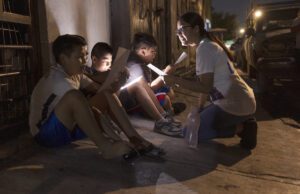
Pope Francis’ theme for the 2023 World Mission Sunday was “Hearts on fire, feet on the move,” which recalls the encounter between two disciples and the risen Christ on the road to Emmaus (Lk 24:13-35).
In an Oct. 18 message he recorded for the Pontifical Mission Societies and posted by the societies on X (formerly Twitter), Pope Francis said that World Mission Sunday was about “worship and mission.”
Speaking in Spanish, Pope Francis urged the faithful to “recognize the Father and worship him in spirit and truth, and go out to announce that message. Not as one who proselytizes, but as one who shares a great grace.”
He described it as a mission “shared with brothers,” that says “this is what I feel, this is the grace I received, I pass it on to you, I give it to you.
“You can do this if you are capable of worshipping,” said Pope Francis.
With “the ongoing situation in the world,” World Mission Sunday “should actually open us to be even more generous,” Ines San Martin, vice president of marketing and communications for the societies’ U.S. office, told OSV News from Rome ahead of the observance. “Now more than ever, the church in the Holy Land needs us, the church in Ukraine needs us.”
“The oldest church has to help the youngest church currently suffering so much due to the devastation of war. We at TPMS strive to model peace by supporting all those suffering from conflicts around the world,” Msgr. Kieran Harrington, national director of the Pontifical Mission Societies, said.
The societies’ worldwide network, which operates at the service of the pope, consists of four organizations designated as pontifical by Pope Pius XI in 1922.
The Society for the Propagation of the Faith supports the evangelization efforts of the local church; the Missionary Childhood Association educates children about their part in the church’s missionary outreach; the Society of St. Peter the Apostle trains the next generation of missionary clergy and consecrated religious; and the Missionary Union of Priests and Religious focuses on forming clergy, religious and pastoral leaders more deeply in their role as evangelizers.
The collection taken up on World Mission Sunday forms the primary financial support for the Pontifical Mission Societies, with U.S. Catholics donating about $30 million in 2022.
The generosity of the nation’s Catholic faithful “cannot be underscored (enough),” said San Martin.
“World Mission Sunday is a concrete response to what is happening in the world,” she said.
Cardinal Christophe Pierre, papal nuncio to the U.S., noted in a reflection for the autumn 2023 issue of Mission magazine, published by the societies, that the collection makes it possible “to provide annual subsidies to missionary dioceses, and to directly support mission seminaries and religious formation houses, the education of children in mission schools, the building of chapels and churches, as well as sustaining homes for orphaned children, the elderly and the sick.”
The support is far more than financial, said San Martin.
“When we say that (the societies) feed the poor, we do mean hunger, but we also mean the hunger of the soul,” said San Martin. “And World Mission Sunday is a great response to give peace — not just material peace, but also spiritual peace to those in need.”
Having a missionary spirit “means we truly are open to our brothers and sisters, and (we are) sharing with others the joy that comes from having met Christ,” she said.
That joy can help to build peace among communities and nations, San Martin said.
“Do you really hate your brother when you see Christ in him?” she said.
Yet “the problem is that we have in many ways given up our missionary animations,” San Martin admitted. “It should be a desperate need (for us) to go out and spread the Gospel, to really answer the great command (of Christ) to make disciples of all nations.”
World Mission Sunday is an opportunity for Catholics to recommit themselves to fulfilling that task, she said, adding “it truly does start with knowing that Jesus died for us to save us.”
SCRANTON – Young adults of the Diocese of Scranton will kick off National Vocation Awareness Week at the eighth annual Leave a Mark Mass on Nov. 5, 2023.
The Mass, which will be celebrated at the Cathedral of Saint Peter in Scranton at 5:00 p.m., is an opportunity for young Catholics to worship together, enjoy delicious food from local food trucks, play some intense rounds of cornhole or card games, and meet new friends!
The name of the Mass comes from Pope Francis’ address at World Youth Day in Poland in 2016. He said, “Dear young people, we didn’t come into this world to ‘vegetate,’ to take it easy, to make our lives a comfortable sofa to fall asleep on. No, we came for another reason: to leave a mark.”
Leave a Mark provides young adults in the Diocese with the opportunity to think about the vocation God is calling them to and to create friendships with others who are doing the same. Together, these young adults can offer their gifts and talents for the Church and discover how they can leave their unique mark on the world.
The Most Reverend Joseph C. Bambera, Bishop of Scranton, will be the principal celebrant and Father Alex Roche, Director of Vocations and Seminarians and Pastor at St. Maria Goretti Parish in Laflin, will be the homilist.
Please plan to join us at the Leave a Mark Mass and social and discover how the Lord may be calling you to leave your mark in your homes, in your parishes, and in the world.
